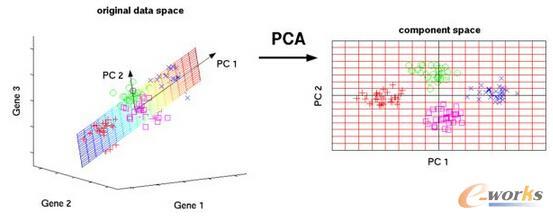We propose a novel and flexible DNA-storage architecture that provides the notion of hierarchy among the objects tagged with the same primer pair and enables efficient data updates. In contrast to prior work, in our architecture a pair of PCR primers of length 20 does not define a single object, but an independent storage partition, which is internally managed in an independent way with its own index structure. We make the observation that, while the number of mutually compatible primer pairs is limited, the internal address space available to any pair of primers (i.e., partition) is virtually unlimited. We expose and leverage the flexibility with which this address space can be managed to provide rich and functional storage semantics, such as hierarchical data organization and efficient and flexible implementations of data updates. Furthermore, to leverage the full power of the prefix-based nature of PCR addressing, we define a methodology for transforming an arbitrary indexing scheme into a PCR-compatible equivalent. This allows us to run PCR with primers that can be variably extended to include a desired part of the index, and thus narrow down the scope of the reaction to retrieve a specific object (e.g., file or directory) within the partition with high precision. Our wetlab evaluation demonstrates the practicality of the proposed ideas and shows 140x reduction in sequencing cost retrieval of smaller objects within the partition.
翻译:我们提出了一个新颖和灵活的DNA储存结构,在标有同一质素配对的物体中提供等级概念,并能够有效地更新数据。与先前的工作不同,在我们的结构中,一对20长的PCR原始件并不定义一个单一对象,而是一个独立的储存分区,由内部独立管理,以自己的索引结构独立管理。我们发现,虽然相互兼容的原始件配对数量有限,但任何一对原始件(即分区)可用的内部地址空间几乎是无限的。我们暴露并利用这一地址空间管理的灵活性,以提供丰富和功能性的存储语义,例如等级数据组织以及高效和灵活地执行数据更新。此外,为了充分利用PCR处理的基于前缀性质的全部力量,我们确定了一种方法,将任意的索引制转换成一个可兼容的PCR等量。这使我们可以运行PCR,使任何一对等量的原始件(即分隔号)都能够不断扩展,以包括索引的预期部分,从而缩小该地址空间管理的范围,以提供丰富和功能性存储存储功能的语义,例如等级数据结构,例如等级数据组织和高效和灵活地执行数据更新数据更新数据更新数据更新数据更新数据更新数据更新数据更新的数据更新。此外,我们提议的140的精确分析的目录,以显示我们内部分析的精确度,以显示我们提出的140或缩缩略图。





